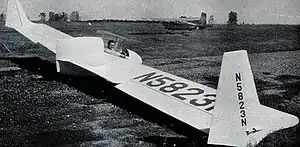Marske XM-1
The Marske XM-1 was an American mid-wing, single-seat, experimental tailless glider that was designed and built by Jim Marske in 1957.[1][2][3][4]
| XM-1 | |
|---|---|
 | |
| The XM-1 in its original configuration with tip rudders | |
| Role | Glider |
| National origin | United States |
| Designer | Jim Marske |
| First flight | 1957 |
| Status | Sole example no longer on FAA registry |
| Number built | one |
Experimentation with the XM-1 lead to the final configuration of the later Marske Pioneer.[1]
Design and development
The first of Marske's flying wings was the XM-1, a design inspired by the flying wing designs of Charles Fauvel and Al Backstrom. He built the XM-1 when he was 19 years old. The aircraft went through several versions, each a modification of the same basic airframe as Marske experimented with configurations. The aircraft started off with fins on the wing tips and was later converted to a single fin at the rear of the short fuselage in its "XM-1D" configuration.[1][4]
The XM-1 was built with a welded steel tube fuselage covered in fiberglass. The 40 ft (12.2 m) wing was fabricated from wood and covered with doped aircraft fabric. The wing employed a 14% Fauvel airfoil. The landing gear was a fixed monowheel.[1]
Only one XM-1 was built. It was registered with the US Federal Aviation Administration in the Experimental - Amateur-built category.[1][2]
Operational history
The XM-1 was described by Soaring Magazine as "easy to fly". The aircraft was stall and spin proof. Marske sold the aircraft and it went through a series of owners. The XM-1 was later removed from the FAA register and likely no longer exists.[1][2]
Variants

Specifications (XM-1B)
Data from The World's Sailplanes:Die Segelflugzeuge der Welt:Les Planeurs du Monde Volume II[5]
General characteristics
- Crew: one
- Length: 8 ft 2 in (2.48 m)
- Wingspan: 38 ft 1 in (11.6 m)
- Height: 3 ft 10 in (1.16 m) at cockpit
- Wing area: 160 sq ft (15 m2)
- Aspect ratio: 9
- Airfoil: 14% Fauvel
- Empty weight: 311 lb (141 kg)
- Gross weight: 551 lb (250 kg)
Performance
- Never exceed speed: 140 mph (226 km/h, 122 kn)
- Aerotow speed: 104.5 mph (90.8 kn; 168.2 km/h)
- Winch launch speed: 105 km/h (65.2 mph; 56.7 kn)
- g limits: +4 -3 at 65.25 mph (56.7 kn; 105.0 km/h)
- Maximum glide ratio: 24:1 at 51 mph (44.3 kn; 82.1 km/h)
- Rate of sink: 175 ft/min (0.89 m/s) at 39.8 mph (34.6 kn; 64.1 km/h)
- Wing loading: 3.4 lb/sq ft (16.7 kg/m2)
References
- Rogers, Bennett (August 1974). "1974 Sailplane Directory, Soaring Magazine". Soaring Magazine. Soaring Society of America: 96.
- Federal Aviation Administration (August 2011). "Make / Model Inquiry Results". Retrieved August 6, 2011.
- Marske, Jim (n.d.). "The Flying Wings of Jim Marske". Archived from the original on December 31, 2005. Retrieved March 20, 2011.
- Marske, Jim (n.d.). "About Jim Marske". Archived from the original on November 27, 2010. Retrieved March 20, 2011.
- Shenstone, B.S.; K.G. Wilkinson (1963). The World's Sailplanes:Die Segelflugzeuge der Welt:Les Planeurs du Monde Volume II (in English, French, and German) (1st ed.). Zurich: Organisation Scientifique et Technique Internationale du Vol a Voile (OSTIV) and Schweizer Aero-Revue. pp. 226–227.
- Shenstone, B.S.; K.G. Wilkinson (1963). The World's Sailplanes:Die Segelflugzeuge der Welt:Les Planeurs du Monde Volume II (in English, French, and German) (1st ed.). Zurich: Organisation Scientifique et Technique Internationale du Vol a Voile (OSTIV) and Schweizer Aero-Revue. pp. 226–227.
- Rogers, Bennett (August 1974). "1974 Sailplane Directory, Soaring Magazine". Soaring Magazine. Soaring Society of America: 96.
- Federal Aviation Administration (August 2011). "Make / Model Inquiry Results". Retrieved August 6, 2011.
- Marske, Jim (n.d.). "The Flying Wings of Jim Marske". Archived from the original on December 31, 2005. Retrieved March 20, 2011.
- Marske, Jim (n.d.). "About Jim Marske". Archived from the original on November 27, 2010. Retrieved March 20, 2011.